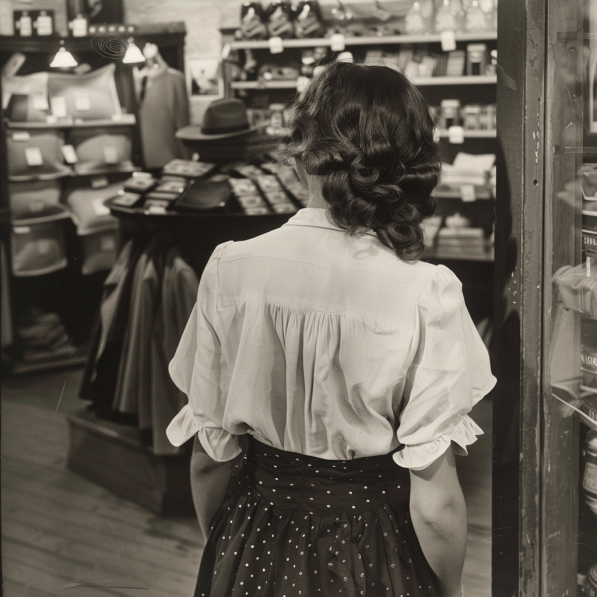
Both of my parents, T.D. and Ruby, grew up on farms in Oklahoma. Mother in Perkins, father in Sapulpa. Their experiences were not the same. Ruby’s life was on a traditional farm with a large family, T.D.’s situation was more unsettled. During that time rural areas were isolated due to difficulty in traveling and poor to non-existent communication. What developed was a social and economic structure in small towns that was very similar to larger communities.
My mother worked in a department store that provided goods and services to town residents and area farmers. While the store was much smaller than you would find in larger cities, it was a central point of identity for Perkins. Almost everyone in the area shopped at the store, which might have been Perkins Dry Goods, but I don’t recall the name.
Ruby described her experiences as wonderful and exciting. She probably was just glad to not be working “the farm” with its many on-going unpleasant tasks. She would dress in what would now be called a uniform, a stiff starched white blouse, and a dark long skirt. Not so different than what the women working in the distant John A. Brown’s Department Store wore in Oklahoma City.
Her environment in this small town was secure, comfortable, and isolated. It was the 1930s with difficult times for most, but her family’s farm was productive, and her parents were progressive allowing her to work outside of the home.
What they knew about big cities often sounded like a place to avoid. Of course, they also recognized that the future, when things got better, would most likely be in the cities. At the time small towns and big cities benefited one another.
What happened to make our circumstances today so different? Obviously, most small farms are gone. If you look at the history of many families, they were farmers. These were farms that mostly supported the needs of the family. In 1935, there were 6.8 million small farms with a possible 40 million living on those farms out of a total U.S. population of 127 million or 32% of the total population; today there are 1.8 million small farms with maybe 7 million people out of the U.S. population of 340 million or 2 percent. The small towns no longer have the small farms and their families to provide them with the economic energy to succeed.
The other factor that has made the rural versus cities divide so large is the demise of the small businesses that used to provide the identity to towns and the backbone of local business owners who supported local government. It was those local business owners who gave the town an ongoing identity and kept the town growing by demanding better schools, roads, and services. They provided jobs and helped establish a sense of pride toward your town. The customers were absorbed by the large national chains or internet shopping. No farmers, no customers equal no back-bone community supporting businesspeople.
Does that mean that soon the whole country will be only cities, of course not. The small towns will survive to one degree or another, but the people will become even more isolated and bitter about their circumstances, unless things change.
The change could be simple. Most people live in big cities because of work. Remote work exists today on a small scale—mostly city dwellers who work out of their suburb homes rather than traveling to the city core. If that model could be expanded to allow population shifts from city areas to rural areas with support services following, it would change everything for small towns. Which in turn would help relieve the pressing problem of housing costs.
This solution has been discussed and prophesized for some time; it appears this might be a reality soon.
The big question in the minds of rural people might be, is that a good thing? They currently identify most city people as demanding, obnoxious assholes based on TV and possibly personal experiences. Will we move the big city problems to every small town with cheap land?
I personally think there is a major shift coming, whether that is good will depend on the people; can we learn to be respectful, to be aware of others, to be appreciative and less demanding—hard to say; my bet would be no.
Keep in mind I predicted the Nuggets would win their second championship.
